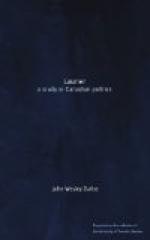The real fight, it was recognized, would be in Rome. Thither there went within two months of the Liberals taking office, two emissaries of the French Liberals, the parish priest of St. Lin, a lifelong, personal and political friend of Laurier, and Chevalier Drolet, one of the Canadian papal Zouaves, who had rallied to the defence of the Holy City twenty-six years before. There followed swiftly two more distinguished intermediaries, Charles Fitzpatrick, solicitor-general of Canada, and Charles Russell, of London, son of Lord Russell of Killowen. Backing them up was a petition to the pope signed by Laurier and forty-four members of parliament, protesting against the political actions of the Canadian episcopate. Nor did the Canadian hierarchy lack representation in Rome. While this conflict of influence was in progress at Rome, the terms of the Manitoba school settlement were made public in November, 1896. The settlement embodied substantial concessions in fact, but Archbishop Langevin and his fellow clerics at once fell upon it. Langevin denounced it as a farce. To Cardinal Begin it appeared an “indefensible abandonment of the best established, most sacred rights of the Catholic minority.” A regime of religious proscription was inaugurated. Public men were subjected to intimidation; Liberal newspapers were banned, among them L’Electeur, the chief organ of the party. The bishops destroyed themselves by their violence. Rome does not lightly quarrel with governments and prime ministers. By March Mgr. Merry Del Val was in Canada as apostolic delegate; and though care was taken to save the faces of the bishops, their concerted assaults upon the government ceased. Laurier had never again to face the embattled bishops, which is not the same thing as saying that they ceased to take a hand in politics. As Professor Skelton truly remarks: “The Archbishop of Montreal, Monseigneur Paul Bruchesi, who kept in close touch with Wilfrid Laurier, soon proved that sunny ways and personal pressure would go further than the storms and thunderbolts of the doughty old warrior of Three Rivers.” With the bishops silenced, Laurier’s foes in Quebec found the issue valueless to them. Their political associates from other provinces, after the disappointment of 1896, would not consent to a revival of the question. One of the party leaders declared he would not touch it with a forty-foot pole. Tupper formally erased it from the party calendar. The question remained quiescent; but Laurier always remained in fear of its re-emergence; and with cause. The resentments it left went underground and later had a revival in the passionate zeal with which the Quebec clergy embraced the faith of nationalism as preached by Bourassa. In one respect the school question and its settlement proved useful. It was the exhibit unfailingly displayed to prove upon needed occasions that the charge was quite untrue that in directing party policy Laurier was unduly sensitive to Quebec sentiment. In effect it was said: “Laurier made Quebec swallow in 1896; now it is your turn”—a formula which finally became tedious through repetition.




